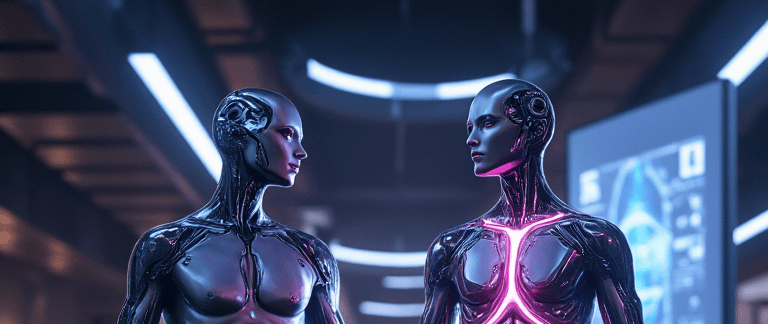Anthropic and Google: A Recap of Their Key Innovations
Main innovations in 2024.
1/1/20253 min read


Anthropic and Google: A Recap of Their Key Innovations in 2024 and Expectations for 2025
As 2024 draws to a close, we have reviewed the main technological innovations in artificial intelligence (AI) from OpenAI. However, we cannot overlook the significant advancements made by other key players such as Anthropic and Google. This article summarizes the most notable achievements of both companies in 2024 and offers a forward-looking view of trends and expectations for 2025.
Anthropic Innovations in 2024
Anthropic, one of the most relevant emerging companies in AI development, has solidified its position with the Claude series of AI models. Below are the key advancements from Anthropic in 2024:
Innovations in 2024:
· March 2024: Release of Claude 3, which includes the Opus, Sonnet, and Haiku models. Opus outperformed models like OpenAI's GPT-4 and Google's Gemini Ultra in benchmark tests, while also incorporating capabilities for processing image inputs.
· May 2024: Launch of Claude Team, Anthropic’s first enterprise offering. This included an iOS app that facilitated the integration of Claude models into corporate environments.
· June 2024: Introduction of Claude 3.5 Sonnet, with improvements in tasks such as coding, multi-step workflows, graph interpretation, and text extraction from images. Additionally, the Artifacts feature was launched, enabling real-time creation and visualization of websites and SVG graphics.
· October 2024: Claude 3.5 introduced a beta feature called "Computer use," which allowed the model to interact with computer systems, performing actions like screenshots, clicks, and typing, bringing AI closer to human-like and autonomous interaction.
· December 2024: Claude 3.5 Haiku became available to all users on both web and mobile platforms, expanding access to advanced AI technology.
Expectations for 2025:
Although Anthropic has not disclosed specific plans for 2025, general trends expected to shape its direction include:
· Collaborative AI Agents: Likely to transition toward systems where multiple AI agents work together, improving efficiency and adaptability in complex tasks.
· Artificial General Intelligence (AGI): Dario Amodei, CEO of Anthropic, has indicated that AGI could become a reality by 2026 or 2027, suggesting that 2025 could be a pivotal year on the path to this goal.
· Cost and Efficiency Challenges: In 2025, Anthropic is expected to focus on optimizing its models to reduce costs and enhance efficiency, balancing innovation with sustainability.
AGI, or "General AI," refers to the ability of machines to learn and perform tasks that typically require human intelligence. For example, AGI could enable robots to make decisions, recognize patterns in vast datasets, and carry out complex tasks autonomously. In short, AGI is like the kind of AI we see in movies, where machines can think and act like humans. It is an exciting and evolving field that has the potential to transform how we live and work in the future.
Google Innovations in 2024
Google continues to solidify its position as a leader in artificial intelligence, with significant advancements in various areas throughout 2024. Below is a timeline of its main innovations:
Innovations in 2024:
· January 2024: Google introduced "Circle to Search," a new feature allowing users to search by drawing a circle around elements on their devices. Updates to Gemini, Chrome, and Pixel were also released, enhancing user experiences with AI.
· February 2024: Launch of Gemini 1.5, an improved version of Google's language model, with new functionalities in Bard and generative AI tools.
· March 2024: Google applied its AI to global flood forecasting and healthcare, showcasing its ability to address global challenges.
· May 2024: During the Google I/O 2024 event, updates were announced for Gemini, Android, Search, and Photos, with strong AI integration to improve products and services.
· July 2024: Google unveiled collaborations for the Olympic Games and enhanced Gemini's features to provide rapid AI responses, demonstrating the model’s flexibility in large-scale events.
· August 2024: New Pixel devices and updates for Android and Chrome were launched, focusing on AI integrations for personalized experiences.
· September 2024: Audio features were introduced in NotebookLM, along with new innovations for wildfire detection and enhanced Gmail security through AI.
· October 2024: At the Made by Google 2024 event, innovations for safer and more productive AI interactions were presented, including Gemini Live, enabling smooth and natural conversational experiences with AI.
Expectations for 2025:
Google is shaping an ambitious strategy for 2025:
· Gemini as a Flagship Product: Gemini is expected to be Google’s flagship product, aiming to reach 500 million users by 2025. It will be integrated into various applications and services to offer more personalized experiences.
· Autonomous AI Agents: Google plans to develop AI agents capable of making decisions for users, automating complex tasks across applications, from email management to trip planning.
· Multimodal and Contextual AI: Multimodal AI will enable more natural and efficient interactions by combining text, images, and other data formats for better understanding and responses.
· Simplification of Complex Tasks: Google’s AI agents are anticipated to manage workflows and automate business processes, optimizing operations and enhancing productivity.
Conclusion
In 2024, both Anthropic and Google achieved remarkable advances in artificial intelligence, integrating their technologies across a wide range of products and services. As we move into 2025, both companies continue to develop autonomous AI agents and progress toward General AI. Undoubtedly, 2025 will be another key year for the development and application of these advanced technologies, driving further innovation in the industry.
